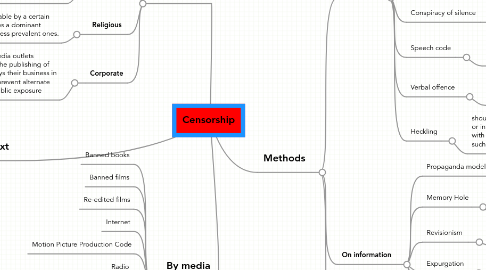
1. Rationale
1.1. Moral
1.1.1. removal of materials that are obscene or considered morally questionable
1.2. Military
1.2.1. keeping military intelligence and tactics confidential and away from the enemy to counter espionage.
1.3. Political
1.3.1. Governments often hold back information from their citizens to exert control over the populace and prevent free expression that might foment rebellion. Prevent antidemocratic groups politicians from gaining exposure. Protect the glory of the state
1.4. Religious
1.4.1. material considered objectionable by a certain faith is removed. Often involves a dominant religion forcing limitations on less prevalent ones.
1.5. Corporate
1.5.1. editors in corporate media outlets intervening to disrupt the publishing of information that portrays their business in a negative light, or to prevent alternate offers from reaching public exposure
2. By media
2.1. Banned books
2.2. Banned films
2.3. Re-edited films
2.4. Internet
2.5. Motion Picture Production Code
2.6. Radio
2.7. Press
2.8. Music
2.9. Video Games
2.10. Speech and expression
2.11. Thought
3. Context
3.1. Corporate
3.2. Political
3.3. Religious
3.4. Ideological
3.5. Criminal speech
3.6. Hate speech
3.7. Media bias
3.8. Suppression of dissent
4. Methods
4.1. On people
4.1.1. Self-censorship
4.1.2. Chilling effect
4.1.2.1. speech or conduct is suppressed by fear of penalization at the interests of an individual or group
4.1.3. Strategic lawsuit
4.1.3.1. lawsuit that is intended to censor, intimidate and silence critics by burdening them with the cost of a legal defense until they abandon their criticism or opposition
4.1.4. Gag order
4.1.4.1. an order, sometimes a legal order by a court or government, restricting information or comment from being made public
4.1.5. Postal censorship
4.1.5.1. inspection or examination of mail, most often by governments.
4.1.6. Prior restraint
4.1.6.1. prevent, in advance, from communicating certain material
4.1.7. Conspiracy of silence
4.1.7.1. tacit communal unspoken consensus not to talk about something
4.1.8. Speech code
4.1.8.1. any rule or regulation that limits, restricts, or bans speech beyond the strict legal limitations upon freedom of speech or press found in the legal definitions of harassment, slander, libel, and fighting words.
4.1.9. Verbal offence
4.1.9.1. crime that exists in many countries that impose limitations on freedom of speech. It refers to dissent and/or blasphemy. Laws that penalize "verbal offences" are often used as an instrument of government and state oppression.
4.1.10. Heckling
4.1.10.1. shouting a disparaging comment at a performance or event, or interrupting speeches, for example at a political meeting, with intent to disturb its performers or participants.Legally, such conduct may constitute protected free speech
4.2. On information
4.2.1. Propaganda model
4.2.1.1. manufacturing consent through manipulation
4.2.2. Memory Hole
4.2.2.1. mechanism for the alteration or disappearance of inconvenient or embarrassing documents,, particularly as part of an attempt to give the impression that something never happened.
4.2.3. Revisionism
4.2.3.1. illegitimate distortion of the historical record such that certain events appear in a more or less favourable light.
4.2.4. Expurgation
4.2.4.1. involves purging anything deemed noxious or offensive, usually from an artistic work
4.2.5. Sanitisation/Redaction
4.2.5.1. removing sensitive information from a document or other medium, so that it may be distributed to a broader audience
4.2.6. Whitewashing
4.2.7. Euphemism
4.3. On media
4.3.1. Newspaper theft
4.3.2. Bleeping
4.3.3. Pixellisation
4.3.4. Content-control software
4.3.4.1. software designed and optimized for controlling what content is permitted to a reader
4.3.5. Radio-jamming
4.3.6. Broadcast delay
